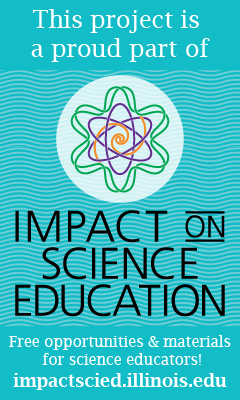Workshop Leaders
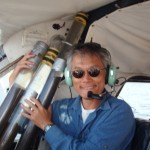 Feng Sheng Hu: I am a broadly trained ecologist working at the interfaces of biological, geological and climatological sciences. The overall objective of my research is to understand patterns and mechanisms of long-term ecosystem dynamics under changing climatic conditions. To achieve this objective, I use “the natural experiments of the past” that are archived in geological deposits. These deposits offer a long-term holistic perspective into past environmental conditions, some of which do not exist today but may be analogs of different climatic conditions in the future. In pursuing my research interests, I have integrated traditional paleoecological techniques (e.g., pollen analysis) and state-of-the-art analytical tools (e.g., biomarker, stable-isotope, and chloroplast-DNA techniques). Feng Sheng Hu received his doctorate from the University of Washington and is currently a full Professor and Head of the Plant Biology Department and is a Professor in the Department of Geology.
Feng Sheng Hu: I am a broadly trained ecologist working at the interfaces of biological, geological and climatological sciences. The overall objective of my research is to understand patterns and mechanisms of long-term ecosystem dynamics under changing climatic conditions. To achieve this objective, I use “the natural experiments of the past” that are archived in geological deposits. These deposits offer a long-term holistic perspective into past environmental conditions, some of which do not exist today but may be analogs of different climatic conditions in the future. In pursuing my research interests, I have integrated traditional paleoecological techniques (e.g., pollen analysis) and state-of-the-art analytical tools (e.g., biomarker, stable-isotope, and chloroplast-DNA techniques). Feng Sheng Hu received his doctorate from the University of Washington and is currently a full Professor and Head of the Plant Biology Department and is a Professor in the Department of Geology.
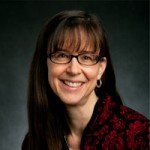 Barbara Hug: My research focuses on developing and using curriculum materials that support inquiry learning in science. There exists a need to develop curriculum materials that help public school teachers and students meet key learning goals aligned with national standards focusing on inquiry as an instructional strategy. Much of my work to date has addressed this need by working on developing materials that allow students to engage in such extended inquiry investigations. I then examine the use of these materials in the context of middle school classrooms. I am particularly interested in what the inquiry practices of students are as they engage in extended investigations and what learning occurs and my research has begun to look at the supports that are needed both by the teachers and students as they engage in inquiry practices. Barbara received her doctorate in Developmental Biology and Genetics and is an Associate Professor in the Department of Curriculum & Instruction in the College of Education.
Barbara Hug: My research focuses on developing and using curriculum materials that support inquiry learning in science. There exists a need to develop curriculum materials that help public school teachers and students meet key learning goals aligned with national standards focusing on inquiry as an instructional strategy. Much of my work to date has addressed this need by working on developing materials that allow students to engage in such extended inquiry investigations. I then examine the use of these materials in the context of middle school classrooms. I am particularly interested in what the inquiry practices of students are as they engage in extended investigations and what learning occurs and my research has begun to look at the supports that are needed both by the teachers and students as they engage in inquiry practices. Barbara received her doctorate in Developmental Biology and Genetics and is an Associate Professor in the Department of Curriculum & Instruction in the College of Education.
Module Presenters/Graduate Students
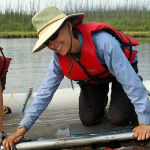 Carolyn Barrett: I am from the northwest suburbs of Chicago and received my B.A. in Biology from Kenyon College in Gambier, OH. While in college, I studied human caused disturbance on both coral reefs, in the British West Indies, and wetlands, in Ohio with the EPA. Currently, I’m a Ph.D. student in Feng Sheng Hu’s Lab at the University of Illinois in the Program of Ecology, Evolution, and Conservation Biology. My research focuses on reconstructing forest fires in Alaska over the past 7,000 years. My teaching experience includes nine biology courses including sections directed towards majors and non-majors, James scholars, and national merit program students. After I graduate I hope to become a professor at a small liberal arts college.
Carolyn Barrett: I am from the northwest suburbs of Chicago and received my B.A. in Biology from Kenyon College in Gambier, OH. While in college, I studied human caused disturbance on both coral reefs, in the British West Indies, and wetlands, in Ohio with the EPA. Currently, I’m a Ph.D. student in Feng Sheng Hu’s Lab at the University of Illinois in the Program of Ecology, Evolution, and Conservation Biology. My research focuses on reconstructing forest fires in Alaska over the past 7,000 years. My teaching experience includes nine biology courses including sections directed towards majors and non-majors, James scholars, and national merit program students. After I graduate I hope to become a professor at a small liberal arts college.
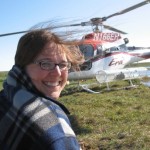 Melissa Chipman: I am from a small town in southern West Virginia and received a B.S. in Environmental Geosciences and a B.A. in Geography from Concord University. I received my Master’s degree in Geology here at the University of Illinois. As a current Ph.D. student in the Hu Lab, I am examining the long-term (~6000-16000 years) fire-regimes of Alaskan tundra in order to examine the link between fire, climate, and vegetation in these ecosystems. Specifically, I utilize ecological proxy indicators in lake sediment, such as diatoms, biogenic silica, carbon and nitrogen percentages, carbonate isotopes, macroscopic charcoal, and chironomids to gauge the response of lake systems to climate fluctuations and/or ecological disturbance.
Melissa Chipman: I am from a small town in southern West Virginia and received a B.S. in Environmental Geosciences and a B.A. in Geography from Concord University. I received my Master’s degree in Geology here at the University of Illinois. As a current Ph.D. student in the Hu Lab, I am examining the long-term (~6000-16000 years) fire-regimes of Alaskan tundra in order to examine the link between fire, climate, and vegetation in these ecosystems. Specifically, I utilize ecological proxy indicators in lake sediment, such as diatoms, biogenic silica, carbon and nitrogen percentages, carbonate isotopes, macroscopic charcoal, and chironomids to gauge the response of lake systems to climate fluctuations and/or ecological disturbance.
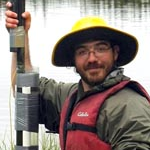 Ryan Kelly: I am from outside Carbondale, IL and attended IMSA before getting my B.S. from the University of Illinois. I’m currently a PhD student in the Plant Biology Department working in Feng Sheng Hu’s lab and am pursing a Masters Degree in Statistics. For my thesis, I intend to model the boreal carbon budget of the next century calibrated to the past two millennia of fire history and climate reconstructions. I am also interested in teaching and spent the 2008-2009 school year working with Hinsdale South High School as a NSF graduate teaching fellow in k-12 education.
Ryan Kelly: I am from outside Carbondale, IL and attended IMSA before getting my B.S. from the University of Illinois. I’m currently a PhD student in the Plant Biology Department working in Feng Sheng Hu’s lab and am pursing a Masters Degree in Statistics. For my thesis, I intend to model the boreal carbon budget of the next century calibrated to the past two millennia of fire history and climate reconstructions. I am also interested in teaching and spent the 2008-2009 school year working with Hinsdale South High School as a NSF graduate teaching fellow in k-12 education.
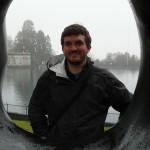 James Planey: I grew up in the Chicago-land area and got my bachelors degree from Illinois Wesleyan University in psychology. After graduating I worked as an environmental educator for the Lake County forest preserve district for two years before coming to the U of I. I am currently enrolled in the Masters of Science Teaching (M.S.T.) program on campus, and also work as a research assistant in a lab that uses radar to study bird migration. My current career goals are to become an engaging and effective high school science educator while continuing to help develop original and relevant curriculum materials for teachers.
James Planey: I grew up in the Chicago-land area and got my bachelors degree from Illinois Wesleyan University in psychology. After graduating I worked as an environmental educator for the Lake County forest preserve district for two years before coming to the U of I. I am currently enrolled in the Masters of Science Teaching (M.S.T.) program on campus, and also work as a research assistant in a lab that uses radar to study bird migration. My current career goals are to become an engaging and effective high school science educator while continuing to help develop original and relevant curriculum materials for teachers.
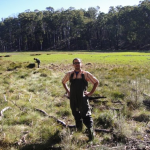 Mike Urban: I am from the wilds of Pennsylvania where I received B.S.’s in Geology and Ecology along with a B.A. in History and Philosophy of Science from the University of Pittsburgh. While at Pittsburgh, I dabbled in both forest ecology and vertebrate paleontology. After my undergraduate years I migrated to the University of Wyoming where I received my M.S. in Botany in the Stephen T. Jackson lab of Quaternary Paleoecology. Currently, I am a Ph.D. student in the Feng Sheng Hu lab at the University of Illinois. My research focuses on the ecology of C4 grasslands and savannas in E. Africa and Australia and how fire acts as a potential control on C4 grass abundance in these regions. Additionally I am investigating the origins of C4 photosynthesis in the deep time fossil record. After I graduate, I hope to become a professor at a large research institution outside of the United States.
Mike Urban: I am from the wilds of Pennsylvania where I received B.S.’s in Geology and Ecology along with a B.A. in History and Philosophy of Science from the University of Pittsburgh. While at Pittsburgh, I dabbled in both forest ecology and vertebrate paleontology. After my undergraduate years I migrated to the University of Wyoming where I received my M.S. in Botany in the Stephen T. Jackson lab of Quaternary Paleoecology. Currently, I am a Ph.D. student in the Feng Sheng Hu lab at the University of Illinois. My research focuses on the ecology of C4 grasslands and savannas in E. Africa and Australia and how fire acts as a potential control on C4 grass abundance in these regions. Additionally I am investigating the origins of C4 photosynthesis in the deep time fossil record. After I graduate, I hope to become a professor at a large research institution outside of the United States.
Contributing Graduate Students
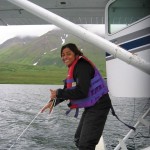 Denise Devotta: Originally, I was interested in exploring how N-fixing plants restore fertility to degraded soils. During my master’s research under Dr. Feng Sheng Hu and Jeffrey Dawson at UIUC, this interest expanded to investigating the impact of N-fixing green alder (Alnus viridis) on aquatic productivity in a sub-alpine watershed in SW Alaska. My PhD research aims to get a better picture of the N and P biogeochemical cycling between terrestrial and aquatic systems in this SW Alaskan watershed. Specifically, I would like to integrate the use of GIS, study of landscape ecology and lake microbial communities into a larger dataset to get a more complete picture of how N and P inputs from alder and salmon are being cycled in the watershed.
Denise Devotta: Originally, I was interested in exploring how N-fixing plants restore fertility to degraded soils. During my master’s research under Dr. Feng Sheng Hu and Jeffrey Dawson at UIUC, this interest expanded to investigating the impact of N-fixing green alder (Alnus viridis) on aquatic productivity in a sub-alpine watershed in SW Alaska. My PhD research aims to get a better picture of the N and P biogeochemical cycling between terrestrial and aquatic systems in this SW Alaskan watershed. Specifically, I would like to integrate the use of GIS, study of landscape ecology and lake microbial communities into a larger dataset to get a more complete picture of how N and P inputs from alder and salmon are being cycled in the watershed.
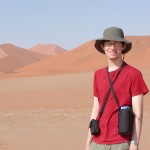 Matias Fernandez: I received my B.A. in Environmental Biology at Columbia University in New York, NY. After working in air quality monitoring for the District of Columbia government for three years I began my PhD with Dr. Hu here at the University of Illinois. For my research I am interested in the post-glacial migration dynamics of conifers in the Pacific-Northwest. I am using a new genomic analysis technique called RAD-Seq to examine the genetic relationships within western redcedar and mountain hemlock which, combined with other lines of evidence, will hopefully clarify some of the post-glacial population dynamics that resulted in this current distribution.
Matias Fernandez: I received my B.A. in Environmental Biology at Columbia University in New York, NY. After working in air quality monitoring for the District of Columbia government for three years I began my PhD with Dr. Hu here at the University of Illinois. For my research I am interested in the post-glacial migration dynamics of conifers in the Pacific-Northwest. I am using a new genomic analysis technique called RAD-Seq to examine the genetic relationships within western redcedar and mountain hemlock which, combined with other lines of evidence, will hopefully clarify some of the post-glacial population dynamics that resulted in this current distribution.
Guest Lecturers
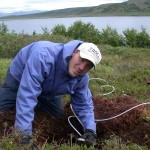 Dave Nelson: Research in my lab focuses on understanding the impacts of environmental change on grasslands, forests, and their soil microbial communities. This work utilizes both geologic and modern studies and a variety of unique isotopic, paleoecological, and genomic methods. To the envy of most children, I get to study dirt and mud as a career! David received his doctorate from the University of Illinois in 2005 and is currently an Assistant Professor at the University of Maryland Center for Environmental Science.
Dave Nelson: Research in my lab focuses on understanding the impacts of environmental change on grasslands, forests, and their soil microbial communities. This work utilizes both geologic and modern studies and a variety of unique isotopic, paleoecological, and genomic methods. To the envy of most children, I get to study dirt and mud as a career! David received his doctorate from the University of Illinois in 2005 and is currently an Assistant Professor at the University of Maryland Center for Environmental Science.
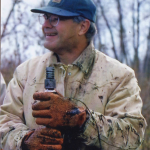 Eric Grimm: I am generally interested the historical context of modern ecosystems including those processes that occur on a time span generally longer than the typical grant tenure or even a human lifetime, but are crucially important for understanding ecosystem structure and dynamics. Most of my research has centered on the upper Midwest and the northern Great Plains. My recent research has focused on high-resolution decadal- to centennial-scale oscillations in vegetation and climate, which are important for understanding the near-term response to greenhouse warming. In addition, I am interested in how this variability, in contrast to long-term mean conditions, influences ecosystem structure. Eric Grimm received his PhD in ecology from the University of Minnesota and is currently Chair of the Botany section and director of the Landscape History Program at the Illinois State Museum.
Eric Grimm: I am generally interested the historical context of modern ecosystems including those processes that occur on a time span generally longer than the typical grant tenure or even a human lifetime, but are crucially important for understanding ecosystem structure and dynamics. Most of my research has centered on the upper Midwest and the northern Great Plains. My recent research has focused on high-resolution decadal- to centennial-scale oscillations in vegetation and climate, which are important for understanding the near-term response to greenhouse warming. In addition, I am interested in how this variability, in contrast to long-term mean conditions, influences ecosystem structure. Eric Grimm received his PhD in ecology from the University of Minnesota and is currently Chair of the Botany section and director of the Landscape History Program at the Illinois State Museum.
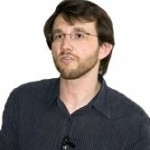 Dirk Verschuren: My research focuses on identifying and sampling African lakes with the most interesting and trustworthy sedimentary records, and exploiting those records to address a wide range of both fundamental and applied research questions, such as the relative importance of bottom-up and top-down control on zooplankton dynamics in fluctuating tropical lakes; the influence of physical limnology on the vulnerability of African lakes to cultural eutrophication; the threat of agricultural soil erosion to African aquatic biodiversity; and the Holocene climate history of tropical Africa. Dirk Verschuren received his PhD at the University of Minnesota and is currently a senior postdoctoral fellow at Ghent University.
Dirk Verschuren: My research focuses on identifying and sampling African lakes with the most interesting and trustworthy sedimentary records, and exploiting those records to address a wide range of both fundamental and applied research questions, such as the relative importance of bottom-up and top-down control on zooplankton dynamics in fluctuating tropical lakes; the influence of physical limnology on the vulnerability of African lakes to cultural eutrophication; the threat of agricultural soil erosion to African aquatic biodiversity; and the Holocene climate history of tropical Africa. Dirk Verschuren received his PhD at the University of Minnesota and is currently a senior postdoctoral fellow at Ghent University.
 Lisa Ainsworth: My research applies physiological, biochemical, genomic and imaging tools to understand the mechanisms of plant responses to climate change. Current areas of research focus include understanding the dynamics of leaf growth and development, investigation of antioxidant metabolism in response to global change, and unraveling the physiological and molecular basis for intraspecific variation in plant responses to climate change. Much of our research uses Free Air Concentration Enrichment (FACE) facilities, where plants are grown under atmospheric conditions forecast for later this century under completely open air conditions. Our research aims to identify key mechanisms by which plants respond to specific elements of climate change, and use those to maximize crop production in the future. Lisa Ainsworth received her PhD at the University of Illinois and is currently an assistant professor in Plant Biology.
Lisa Ainsworth: My research applies physiological, biochemical, genomic and imaging tools to understand the mechanisms of plant responses to climate change. Current areas of research focus include understanding the dynamics of leaf growth and development, investigation of antioxidant metabolism in response to global change, and unraveling the physiological and molecular basis for intraspecific variation in plant responses to climate change. Much of our research uses Free Air Concentration Enrichment (FACE) facilities, where plants are grown under atmospheric conditions forecast for later this century under completely open air conditions. Our research aims to identify key mechanisms by which plants respond to specific elements of climate change, and use those to maximize crop production in the future. Lisa Ainsworth received her PhD at the University of Illinois and is currently an assistant professor in Plant Biology.

